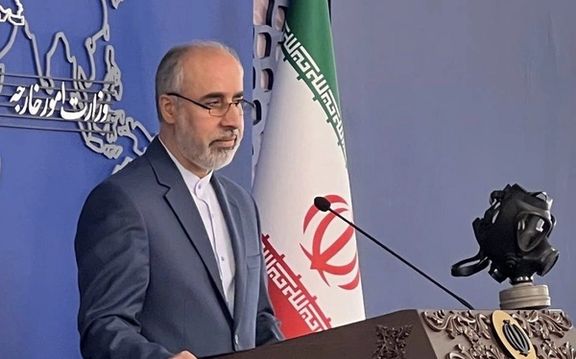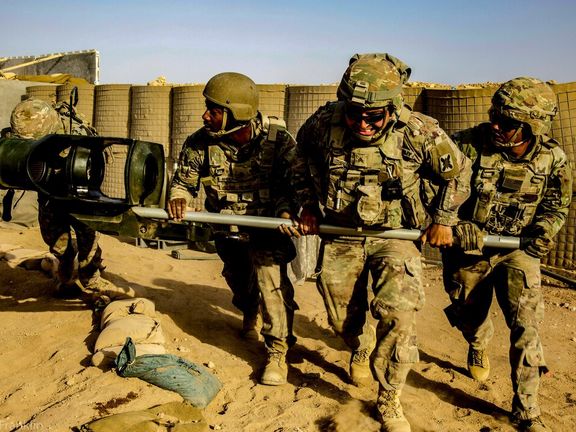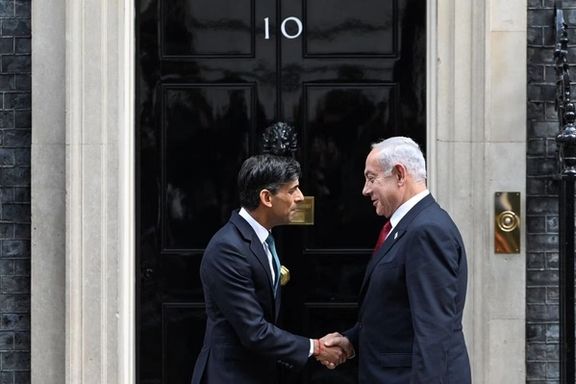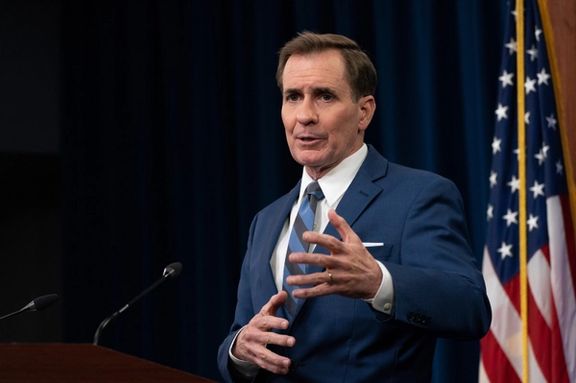UK Defense Ministry Says Russia Uses More Iranian Drones In Ukraine

While the Islamic Republic still claims to have no role in the war in Ukraine, Britain announced that Russia has increased the use of Iranian-made drones in its war against Ukraine.

While the Islamic Republic still claims to have no role in the war in Ukraine, Britain announced that Russia has increased the use of Iranian-made drones in its war against Ukraine.
The British Ministry of Defense announced on Sunday the widespread use of Iran-made drones by Russia in the last few days.
“Since the start of March 2023, Russia has likely launched at least 71 Iranian-designed Shahed series one-way attack uncrewed aerial vehicle (OWA-UAVS) against targets across Ukraine,” reads a tweet by the Ministry of Defense.
Kyiv reported a large Russian drone attack using Shahed UAVs on March 22 to target civilian areas.
According to the British Ministry of Defense, Russia is likely launching Shaheds from two axes: from Russia’s Krasnodar region in the east and from Bryansk Oblast in the north-east.
“This allows Russia flexibility to target a broad sector of Ukraine and decreases flying time to targets in the north of Ukraine. It is also likely to be a further attempt to stretch Ukrainian air defenses,” added the report.
The report comes a few days after Iran’s Supreme Leader Ali Khamenei in his speech in the religious city of Mashhad categorically rejected participation in the war in Ukraine.
"They falsely said that Iran is participating in the war in Ukraine, this is not the case at all," he stressed.
Western countries have repeatedly sanctioned the Islamic Republic for sending drones to Russia for use in the Ukraine war.

Iran’s foreign ministry has condemned US retaliatory strikes on its proxy forces in Syria, labelling them as “terrorist aggression” against “civilian targets.”
Ministry spokesman Nasser Kanaani was quoted by the official news agency IRNA as saying, “The continuation of America’s illegal presence in, and occupation of parts of Syria, as well attacks against different targets in that country, are violations of international law and Syria’s sovereignty and territorial integrity.”
The US military retaliated against drone and rocket attacks targeting its bases in northeastern Syria launched by proxy forces controlled by Iran’s Revolutionary Guard, the IRGC, on Thursday and Friday.
The Pentagon and the Biden administration, while reiterating their determination to defend US personnel, emphasized that they were careful in their military strikes to minimize loss of any Iranian lives and collateral damage.
Kanaani referring to US support for “the fake Zionist regime” said, “US claims of maintaining a presence in Syria for fighting against the Islamic State group, which the US has a major role in its creation, is simply an excuse for occupation and pillaging Syria’s national wealth, including its energy resources.”
Tehran has been repeatedly alleging that the United States is “stealing oil” from Syrian oil fields close to its bases.
The spokesman also rejected US accusations as unfounded, implicitly referring to statements that attacks on US forces were launched by militias under Iranian command.
Earlier, Iran's security council warned the US against further attacks, stressing that any further strikes will be countered immediately.
Critics in the US have accused the Biden Administration of a meek response to Iranian-led attacks in Syria and Iraq. Since President Joe Biden assumed office there have been 80 such attacks and but only a few US retaliatory strikes.

Iran's security council Saturday warned the United States against further attacks on its proxy bases in Syria stressing that any further strikes will be countered immediately.
Supreme National Security Council spokesman Keyvan Khosravi issued the warning following reports about an increase in casualties of US attacks on pro-Iranian militias in Syria.
So far, militias controlled by Iran have carried out at least two attacks on US bases in northeastern Syria, with two instances of US retaliation.
According to a report by the UK-based Syrian Observatory for Human Rights, the attacks left 19 dead, including three Syrian regime soldiers and 16 members of Iran-backed forces.
The Observatory said the attacks were carried out in the early hours of Friday local time by US fighter jets and drones, targeting positions of forces led by the Iranian Revolutionary Guards (IRGC) in Al-Bokamal desert, as well as other positions on the southern outskirts of Al-Mayadeen city and an ammunition warehouse opposite the “Officers Residences” in Harabesh neighborhood in Deir ez-Zur city.
The Pentagon said on Friday that the US military carried out the attack against militia groups who it blamed for a drone attack on Thursday that killed an American contractor, injured another, and wounded five US troops.
The US intelligence community assessed that the one-way attack drone was Iranian in origin, the military said, a conclusion that could further aggravate already strained tensions between Washington and Tehran.

Tit-for-tat attacks have continued between the US military and Iranian-backed forces in Syria, who threaten more strikes as US vows to protect its personnel.
There were no statements by Iranian officials by midday Saturday in Tehran, while Tasnim news agency affiliated to the Revolutionary Guard (IRGC) carried the news of events in Syria without carrying any comments by Iranian officials.
The US conducted at least one major air strike early Friday after a suicide drone attack killed a US contractor and injured several servicemen at a US base in northeastern Syria.
Apparently, the US carried out more retaliatory strikes later on Friday following a second attack by Iran-controlled militias. It is not clear if these were air attacks or missile strikes. The US Central Command issued a statement saying that Friday morning at approximately 8:05 local time, “ten rockets targeted coalition forces…”
Meanwhile, these forces said in an online statement late Friday that they have a "long arm" to respond to further US strikes on their positions, after tit-for-tat strikes in Syria over the last 24 hours.
The statement, signed by the Iranian Advisory Committee in Syria, said US strikes had left several fighters dead and wounded, without specifying their nationality.
"We have the capability to respond if our centers and forces in Syria are targeted," the statement said.
According to a war monitor, at least 16 people were killed in the first US retaliatory attack, mostly local or non-Iranian personnel, while the identity of four casualties remain unknown.
President Joe Biden on Friday warned Iran that the United States would "act forcefully" to protect Americans, after the US carried out air strikes against Iran-backed forces.
"Make no mistake: the United States does not ... seek conflict with Iran but be prepared for us to act forcefully to protect our people," Biden told reporters during a visit to Canada.
Earlier, US officials had emphasized that the retaliatory strike was a measured response to the attack on the US base, but the follow-up attacks by Iranian-supported forces posed the question if more serious retaliation is needed to deter Iran.
Republican Senator Lindsey Graham tweeted that “The Biden administration could learn something from the Trump Administration about deterrence…The targets the Iranians fear most are their refineries. For every attack against Americans in the future, take down an Iranian refinery and their oil and gas infrastructure.”
In fact, former President Donald Trump who ordered the killing of IRGC’s Qassem Soleimani in Baghdad in January 2020, had earlier refrained from retaliation against Iran when Saudi Arabia’s vital oil installations came under Iranian drone and missile attacks in September 2019.
Other critics argued that targeting Iran’s proxies is not a real deterrent, since the purpose of having these forces is exactly to offer “plausible deniability” by Tehran.
The main reason for Soleimani’s killing according to the Trump Administration was his efforts to organize more attacks on US troops in the region.
Congresswoman Joni Ernst tweeted, “Iranian proxies have attacked US servicemembers nearly 80 times. What has President Biden done about it? Cozied up to Iran in hopes of a fanciful and flawed “nuclear agreement,” & failed to hit Iran’s regime where it hurts, their wallets, by enforcing much-needed sanctions.”

Israeli Prime Minister Benjamin Netanyahu met with his British counterpart Rishi Sunak in London to discuss where Iran’s nuclear threat was discussed among other issues.
Readouts of the Friday meeting from both sides said the two talked about the security and defense challenges they share, including the threat posed by Iran, as well as ways to strengthen the relationship between Britain and Israel.
Netanyahu also invited Sunak for an official visit to Israel, the Israeli statement said. He left Downing Street less than an hour after he arrived as hundreds of protesters gathered at the gates of No 10 to demonstrate against the Israeli prime minister’s policies, especially his overhaul of the judiciary.
Downing Street said that in his meeting with Netanyahu, Sunak "stressed the importance of upholding the democratic values that underpin our relationship, including in the proposed judicial reforms in Israel.”
It added that the two men also discussed the war in Ukraine and Iran's "destabilizing activity", as well as its nuclear program, and agreed that their “governments would continue to work closely together to push back against aggression and manage the risk of nuclear proliferation.”
According to a statement from Netanyahu’s office before his London trip, his meetings are set to focus on the need to formulate a “united international front” against Iran in order to stop its nuclear program.
Earlier in the month, Israeli Foreign Minister Eli Cohen was in London to argue for Jerusalem’s position about the Islamic Republic’s threat and bolster bilateral economic ties.

Tehran-linked groups targeted US forces in Syria for a second day in a row Friday, after the United States conducted an air strike against their bases following a drone strike Thursday.
White House National Security Council spokesman John Kirby said no American personnel were hurt in the new attack in northeast Syria, calling the incident an initial reaction to US retaliatory strikes on Iran-aligned groups in the area.
"It is not uncommon, when we take a retaliatory strike like this, for them to answer right back with some ineffective rocket fire. And these were largely, completely ineffective," Kirby told MSNBC. "Nobody was hurt, no US casualties at all."
The attack on Thursday with a suicide drone killed a US contractor and injured several servicemen. The US immediately retaliated with air strikes.
The US intelligence community assessed that the one-way attack drone was Iranian in origin, the Pentagon said, a conclusion that could further aggravate already strained relations between Washington and Tehran.
The new rocket attack by Iran-linked forces targeted a US base near the Al-Omar oil field. Lebanese pro-Iranian TV channel Al Mayadeen was first to report the attack.
The attacks by Iranian-led groups come just two weeks after Tehran signed a deal with Saudi Arabia to restore relations, a move seen by analysts as potentially beneficial for stability in the region.